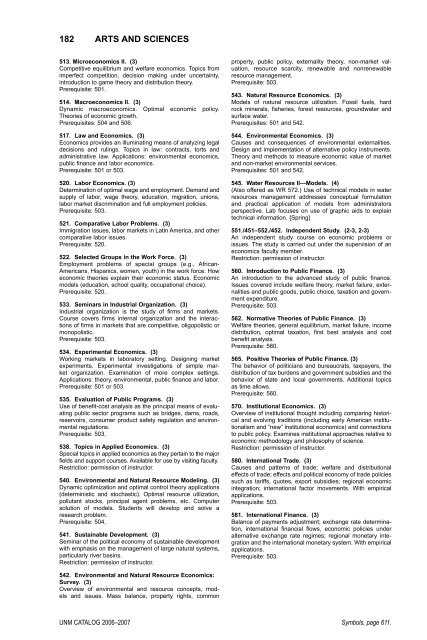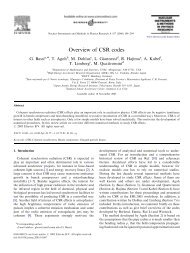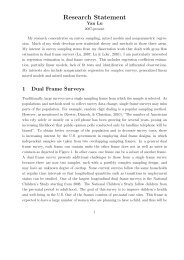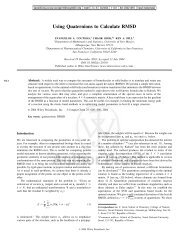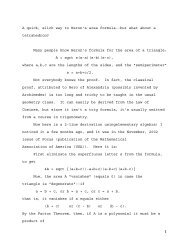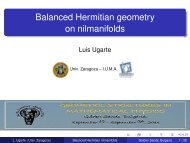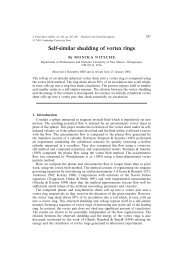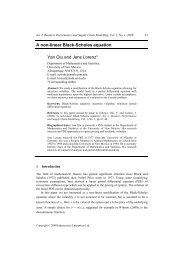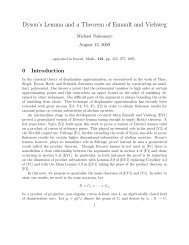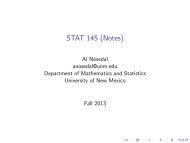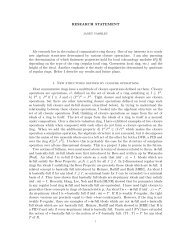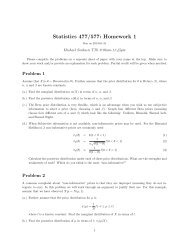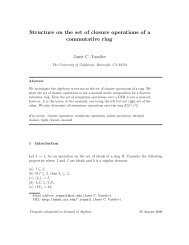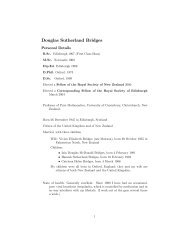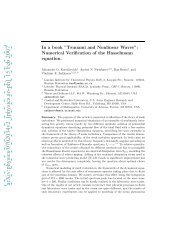OEO Office of Equal Opportunity - Department of Mathematics and ...
OEO Office of Equal Opportunity - Department of Mathematics and ...
OEO Office of Equal Opportunity - Department of Mathematics and ...
Create successful ePaper yourself
Turn your PDF publications into a flip-book with our unique Google optimized e-Paper software.
182 ARTS AND SCIENCES<br />
513. Microeconomics II. (3)<br />
Competitive equilibrium <strong>and</strong> welfare economics. Topics from<br />
imperfect competition, decision making under uncertainty,<br />
introduction to game theory <strong>and</strong> distribution theory.<br />
Prerequisite: 501.<br />
514. Macroeconomics II. (3)<br />
Dynamic macroeconomics. Optimal economic policy.<br />
Theories <strong>of</strong> economic growth.<br />
Prerequisites: 504 <strong>and</strong> 506.<br />
517. Law <strong>and</strong> Economics. (3)<br />
Economics provides an illuminating means <strong>of</strong> analyzing legal<br />
decisions <strong>and</strong> rulings. Topics in law: contracts, torts <strong>and</strong><br />
administrative law. Applications: environmental economics,<br />
public finance <strong>and</strong> labor economics.<br />
Prerequisite: 501 or 503.<br />
520. Labor Economics. (3)<br />
Determination <strong>of</strong> optimal wage <strong>and</strong> employment. Dem<strong>and</strong> <strong>and</strong><br />
supply <strong>of</strong> labor, wage theory, education, migration, unions,<br />
labor market discrimination <strong>and</strong> full employment policies.<br />
Prerequisite: 503.<br />
521. Comparative Labor Problems. (3)<br />
Immigration issues, labor markets in Latin America, <strong>and</strong> other<br />
comparative labor issues.<br />
Prerequisite: 520.<br />
522. Selected Groups in the Work Force. (3)<br />
Employment problems <strong>of</strong> special groups (e.g., African-<br />
Americans, Hispanics, women, youth) in the work force. How<br />
economic theories explain their economic status. Economic<br />
models (education, school quality, occupational choice).<br />
Prerequisite: 520.<br />
533. Seminars in Industrial Organization. (3)<br />
Industrial organization is the study <strong>of</strong> firms <strong>and</strong> markets.<br />
Course covers firms internal organization <strong>and</strong> the interactions<br />
<strong>of</strong> firms in markets that are competitive, oligopolistic or<br />
monopolistic.<br />
Prerequisite: 503.<br />
534. Experimental Economics. (3)<br />
Working markets in laboratory setting. Designing market<br />
experiments. Experimental investigations <strong>of</strong> simple market<br />
organization. Examination <strong>of</strong> more complex settings.<br />
Applications: theory, environmental, public finance <strong>and</strong> labor.<br />
Prerequisite: 501 or 503.<br />
535. Evaluation <strong>of</strong> Public Programs. (3)<br />
Use <strong>of</strong> benefit-cost analysis as the principal means <strong>of</strong> evaluating<br />
public sector programs such as bridges, dams, roads,<br />
reservoirs, consumer product safety regulation <strong>and</strong> environmental<br />
regulations.<br />
Prerequisite: 503.<br />
538. Topics in Applied Economics. (3)<br />
Special topics in applied economics as they pertain to the major<br />
fields <strong>and</strong> support courses. Available for use by visiting faculty.<br />
Restriction: permission <strong>of</strong> instructor.<br />
540. Environmental <strong>and</strong> Natural Resource Modeling. (3)<br />
Dynamic optimization <strong>and</strong> optimal control theory applications<br />
(deterministic <strong>and</strong> stochastic). Optimal resource utilization,<br />
pollutant stocks, principal agent problems, etc. Computer<br />
solution <strong>of</strong> models. Students will develop <strong>and</strong> solve a<br />
research problem.<br />
Prerequisite: 504.<br />
541. Sustainable Development. (3)<br />
Seminar <strong>of</strong> the political economy <strong>of</strong> sustainable development<br />
with emphasis on the management <strong>of</strong> large natural systems,<br />
particularly river basins.<br />
Restriction: permission <strong>of</strong> instructor.<br />
property, public policy, externality theory, non-market valuation,<br />
resource scarcity, renewable <strong>and</strong> nonrenewable<br />
resource management.<br />
Prerequisite: 503.<br />
543. Natural Resource Economics. (3)<br />
Models <strong>of</strong> natural resource utilization. Fossil fuels, hard<br />
rock minerals, fisheries, forest resources, groundwater <strong>and</strong><br />
surface water.<br />
Prerequisites: 501 <strong>and</strong> 542.<br />
544. Environmental Economics. (3)<br />
Causes <strong>and</strong> consequences <strong>of</strong> environmental externalities.<br />
Design <strong>and</strong> implementation <strong>of</strong> alternative policy instruments.<br />
Theory <strong>and</strong> methods to measure economic value <strong>of</strong> market<br />
<strong>and</strong> non-market environmental services.<br />
Prerequisites: 501 <strong>and</strong> 542.<br />
545. Water Resources II—Models. (4)<br />
(Also <strong>of</strong>fered as WR 572.) Use <strong>of</strong> technical models in water<br />
resources management addresses conceptual formulation<br />
<strong>and</strong> practical application <strong>of</strong> models from administrators<br />
perspective. Lab focuses on use <strong>of</strong> graphic aids to explain<br />
technical information. {Spring}<br />
551./451–552./452. Independent Study. (2-3, 2-3)<br />
An independent study course on economic problems or<br />
issues. The study is carried out under the supervision <strong>of</strong> an<br />
economics faculty member.<br />
Restriction: permission <strong>of</strong> instructor.<br />
560. Introduction to Public Finance. (3)<br />
An introduction to the advanced study <strong>of</strong> public finance.<br />
Issues covered include welfare theory, market failure, externalities<br />
<strong>and</strong> public goods, public choice, taxation <strong>and</strong> government<br />
expenditure.<br />
Prerequisite: 503.<br />
562. Normative Theories <strong>of</strong> Public Finance. (3)<br />
Welfare theories, general equilibrium, market failure, income<br />
distribution, optimal taxation, first best analysis <strong>and</strong> cost<br />
benefit analysis.<br />
Prerequisite: 560.<br />
565. Positive Theories <strong>of</strong> Public Finance. (3)<br />
The behavior <strong>of</strong> politicians <strong>and</strong> bureaucrats, taxpayers, the<br />
distribution <strong>of</strong> tax burdens <strong>and</strong> government subsidies <strong>and</strong> the<br />
behavior <strong>of</strong> state <strong>and</strong> local governments. Additional topics<br />
as time allows.<br />
Prerequisite: 560.<br />
570. Institutional Economics. (3)<br />
Overview <strong>of</strong> institutional thought including comparing historical<br />
<strong>and</strong> evolving traditions (including early American institutionalism<br />
<strong>and</strong> “new” institutional economics) <strong>and</strong> connections<br />
to public policy. Examines institutional approaches relative to<br />
economic methodology <strong>and</strong> philosophy <strong>of</strong> science.<br />
Restriction: permission <strong>of</strong> instructor.<br />
580. International Trade. (3)<br />
Causes <strong>and</strong> patterns <strong>of</strong> trade; welfare <strong>and</strong> distributional<br />
effects <strong>of</strong> trade; effects <strong>and</strong> political economy <strong>of</strong> trade policies<br />
such as tariffs, quotes, export subsidies; regional economic<br />
integration; international factor movements. With empirical<br />
applications.<br />
Prerequisite: 503.<br />
581. International Finance. (3)<br />
Balance <strong>of</strong> payments adjustment; exchange rate determination,<br />
international financial flows, economic policies under<br />
alternative exchange rate regimes; regional monetary integration<br />
<strong>and</strong> the international monetary system. With empirical<br />
applications.<br />
Prerequisite: 503.<br />
542. Environmental <strong>and</strong> Natural Resource Economics:<br />
Survey. (3)<br />
Overview <strong>of</strong> environmental <strong>and</strong> resource concepts, models<br />
<strong>and</strong> issues. Mass balance, property rights, common<br />
UNM CATALOG 2006–2007 Symbols, page 611.


